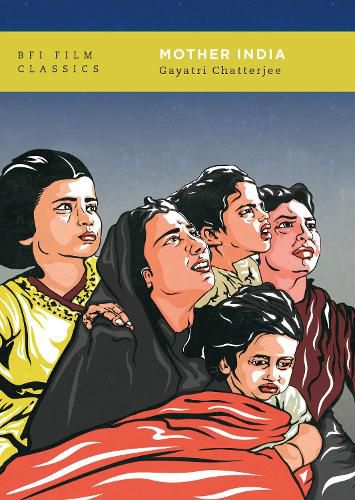Readings Newsletter
Become a Readings Member to make your shopping experience even easier.
Sign in or sign up for free!
You’re not far away from qualifying for FREE standard shipping within Australia
You’ve qualified for FREE standard shipping within Australia
The cart is loading…






Mehboob Khan’s 1957 epic family drama Mother India, starring movie legends Nargis, Sunil Dutt and Rajendra Kumar, is a cornerstone of Indian cinema.
In her insightful study of this classic, Gayatri Chatterjee draws on new research in the Mehboob studio archive to outline the film’s eventful production history, the ambitious vision of its director, and the performances of its stars. Rooted both in Hindu mythology and in the collective experience of a newly-independent nation-state on the brink of industrialisation and social change, this family melodrama inexorably towards tragedy and renewal. Chatterjee’s careful analysis reflects the film’s vibrancy and passion and illuminates its many aspects - performance styles, reception and reputation, mythological underpinnings, its relationship to India’s post-Independence culture and politics, and its many references to the history of a country in transition.
In her foreword to this new edition, the author reflects upon the film’s impact at the time of its release, and its continuing resonance for audiences in many different countries around the world.
$9.00 standard shipping within Australia
FREE standard shipping within Australia for orders over $100.00
Express & International shipping calculated at checkout
Mehboob Khan’s 1957 epic family drama Mother India, starring movie legends Nargis, Sunil Dutt and Rajendra Kumar, is a cornerstone of Indian cinema.
In her insightful study of this classic, Gayatri Chatterjee draws on new research in the Mehboob studio archive to outline the film’s eventful production history, the ambitious vision of its director, and the performances of its stars. Rooted both in Hindu mythology and in the collective experience of a newly-independent nation-state on the brink of industrialisation and social change, this family melodrama inexorably towards tragedy and renewal. Chatterjee’s careful analysis reflects the film’s vibrancy and passion and illuminates its many aspects - performance styles, reception and reputation, mythological underpinnings, its relationship to India’s post-Independence culture and politics, and its many references to the history of a country in transition.
In her foreword to this new edition, the author reflects upon the film’s impact at the time of its release, and its continuing resonance for audiences in many different countries around the world.